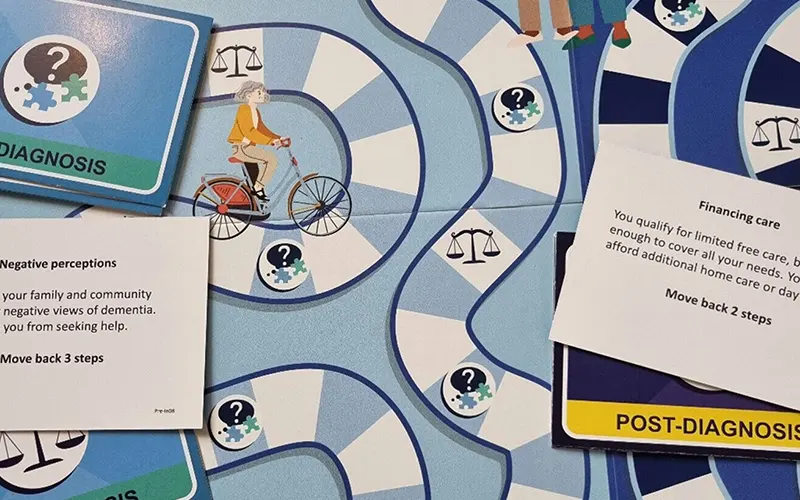Researchers specializing in dementia from the University of Liverpool have observed encouraging initial results while examining the effects of a board game addressing dementia inequalities. Their study, titled “Co-producing a board game to learn and engage about dementia inequalities: First impacts on knowledge in the general population,” has been published in Health Expectations.
Getting a dementia diagnosis can be hard, and it depends on many things like education, culture, stigma, what the doctor knows, age, and the type of dementia. For some people, especially those from minority backgrounds in rich countries or those in poorer countries, culture and understanding can make it even harder. In these places, there might be a lot of stigma around dementia, and not enough healthcare resources, making it tough for people to get diagnosed.
No matter where someone lives, if they are under 65 or have symptoms of a rare type of dementia, like behavioral-variant frontotemporal dementia, Lewy body dementia, semantic dementia, or posterior cortical atrophy, they are less likely to get a diagnosis, or it might be delayed compared to someone over 65 with symptoms of the most common type, Alzheimer’s disease. This happens because some doctors may not be aware that people in their 30s can have dementia symptoms.
The Dementia Inequalities Game sheds light on the challenges individuals face before and after a dementia diagnosis, highlighting available support and its positive outcomes. Developed through a collaboration between the University of Liverpool, The Lewy Body Society, and representatives from the third sector, along with input from individuals with firsthand experience of dementia, this game provides valuable insights into the dementia journey.
In a recently published paper, Dr. Clarissa Giebel, Senior Research Fellow in the Institute of Population Health at the University of Liverpool, details the creation process of the game and discusses its current impact.
The research paper highlights that the game is groundbreaking, addressing a crucial and innovative need for educating various audiences, including health and social care professionals, students, individuals affected by dementia, and the general public. As the first of its kind, the game aims to bridge the gap between academia and non-academic stakeholders. Preliminary feedback from early users, who participated in a questionnaire, suggests that the game effectively enhances knowledge about dementia inequalities.
Designed in a roll-and-move style, the board game takes players through a journey, showcasing the challenges individuals face and the available support. Additionally, players engage with a variety of questions, prompting teams to reflect on and discuss issues such as the expenses associated with dementia care and the different types of dementia, including Alzheimer’s disease and Lewy body dementia.
Dr. Clarissa Giebel, a Senior Research Fellow at the University of Liverpool’s Institute of Population Health and the NIHR Applied Research Collaboration North West Coast, expressed her satisfaction with the initial feedback on the game. She stated, “I’m pleased to observe that the game effectively brings attention to the disparities and challenges encountered both before and after a dementia diagnosis.
“With one million people in the UK living with dementia, and numbers on the rise, it stands as a significant cause of disability in later life, surpassing cancer, cardiovascular disease, and stroke. Dementia is a global public health concern, impacting not only individuals with the condition but also their family members and friends.
“We eagerly anticipate further exploration of the game’s impact through ongoing research.”
Read More : Dementia Patients Retain Learning Abilities
References
https://medicalxpress.com/news/2024-01-impact-dementia-board-game.html
https://onlinelibrary.wiley.com/doi/full/10.1111/hex.13977







